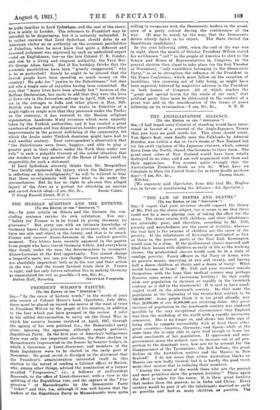PRESIDENT WILSON'S FAILURE.
[To THE EDITOR or THE " SPECTATOR."] SIE,—" In the cause of historic truth," in the words of your able review of Colonel House's book (Spectator, July 30th), there must be placed on record one source of the want of trust in President Wilson by the people of his country, in addition to the four which you have grouped in the review. I refer to his settled determination to carry on the Great War in which his country became involved in April, 1917, through the agency of his own political (i.e., the Democratic) party alone, ignoring the opposing, although equally patriotic, Republican Party. In the first year of America's belligerency there was only one important election, the State election in Massachusetts (represented in the Senate by Senator Lodge), in which a Governor, a Lient.-Governor, and members of the State legislature were to be elected in the early part of November. No great secret is divulged in the statement that the President's administration interested itself in this election to the extent of sending a Cabinet officer to Boston, who, among other things, advised the nomination of a former so-called "Progressive," i.e., a follower of ex-President Roosevelt, to the office of Lieut.-Governor, with a view to the splitting of the Republitan vote, and the capture of the "Pro- gressives' " of Massachusetts by the Democratic Party " ticket," and this, too, although it was well known that the leaders of the Republican Party in Massachusetts were quite willing to co-operate with the Democratic leaders in the avoid- ance of a party contest during the continuance of the war. (It may be noted, by the way, that the Democratic device utterly failed in its object. The State elected the Republican candidates.) In the year following (1918), when the end of the war was in sight, about the month of October President Wilson issued his well-known "call" to the people of America to elect to the Senate and House of Representatives in Congress, in the general election then about to take place (on the first Tuesday of November), "only candidates belonging to the Democratic Party," so as to strengthen the influence of the President in the Peace Conference, which must follow on the cessation of hostilities, this crowning act of folly being, as might have been expected, followed by majorities adverse to the President in both houses of Congress. All of which teaches the " great and special lesson for the whole of our race," that political party lines must be obliterated in the conduct of a great war and in the consideration of the terms of peace following on its termination.—I am, Sir, &c., S. R. If.


































 Previous page
Previous page